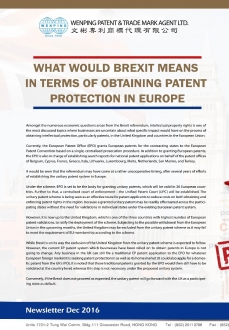Amongst the numerous economic questions arose from the Brexit referendum, intellectual property rights is one of the most discussed topics where businesses are uncertain about what specific impact would have on the process of obtaining intellectual protection, particularly patents, in the United Kingdom and countries in the European Union.
Currently, the European Patent Office (EPO) grants European patents for the contracting states to the European Patent Convention based on a single, centralised prosecution procedure. In addition to granting European patents, the EPO is also in charge of establishing search reports for national patent applications on behalf of the patent offices of Belgium, Cyprus, France, Greece, Italy, Lithuania, Luxembourg, Malta, Netherlands, San Marino, and Turkey.
It would be seen that the referendum may have come at a rather uncooperative timing, after several years of efforts of establishing the unitary patent system in Europe.
Under the scheme, EPO is set to be the body for granting unitary patents, which will be valid in 26 European countries. Further to that, a centralised court of enforcement - the Unified Patent Court (UPC) will be established. The unitary patent scheme is being seen as an effective route for patent applicants to reduce costs on both obtaining and enforcing patent rights in the region, because a granted unitary patent may be readily effectuated across the participating states without the need for validations in individual states under the existing European patent system.
However, it is now up to the United Kingdom, which is one of the three countries with highest number of European patent validations, to ratify the deployment of the scheme. Subjecting to the possible withdrawal from the European Union in the upcoming months, the United Kingdom may be excluded from the unitary patent scheme as it may fail to meet the requirement of EU membership according to the scheme.
While Brexit is on its way the exclusion of the United Kingdom from the unitary patent scheme is expected to follow. However, the current EP patent system which businesses have been relied on to obtain patents in Europe is not going to change. Any business in the UK can still file a traditional EP patent application to the EPO for whatever European foreign market it is seeking patent protection in as well as its home market (it could also apply for a domestic patent from the UK's IPO). It is noted that those traditional patents granted by the EPO would then still have to be validated at the country level, whereas this step is not necessary under the proposed unitary system.
Conversely, if the Brexit does not proceed as expected, the unitary patent will go forward with the UK as a participating state as default.
According to the EPO, the cost benefits for obtaining unitary patents can reach up to 70% comparing to traditional EP patents. While the above would certainly be advantageous for larger businesses which target multiple markets, the benefits for smaller enterprises would be significantly dependent on the number of foreign markets where patent protection is to be sought. This is particular true if patent protection is only to be sought in say, two European markets, for instance, the United Kingdom and France, a question will arise regarding whether it would still be cost effective to pursue a unitary patent, while one could apply for individual patent in the two countries separately.
On the other hand, if the Brexit were to occur and that the United Kingdom is eventually excluded from the unitary patent scheme, business enterprises who needed patent protection across Europe can still file unitary patents, whereas such protection will not cover the United Kingdom. Therefore, filing of a separate patent application in the United Kingdom will be necessary.
In the time being, there are still uncertainties surrounding the unitary patent schemes and the unitary patent court in view of the British exit from European Union. However, one could be assured that the classical EPO and national patents are not affected by Brexit. The UK could certainly ratify the UPC Agreement, even when it votes for a Brexit, for some other good reasons. Nevertheless, these issues will take time, perhaps years more, to resolve.


